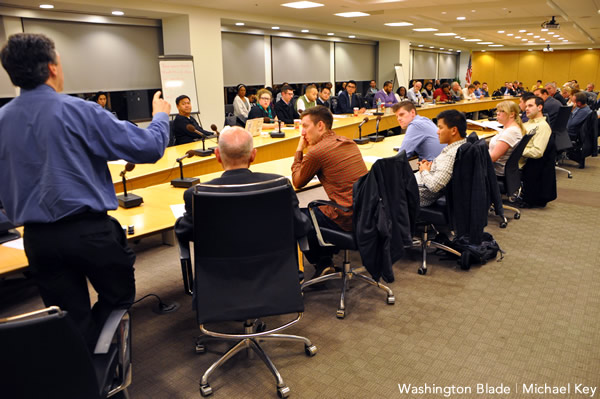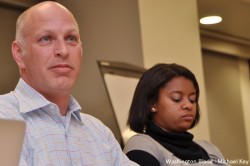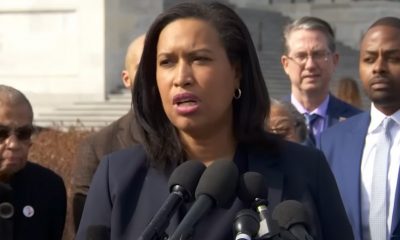Local
Stein Club election results upheld at special meeting
Challenge to validity of election dropped, proposed bylaw changes to be considered at next regular meeting
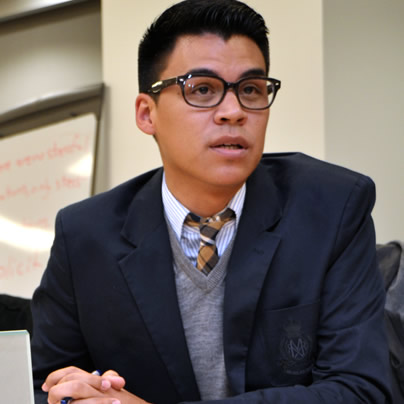
More than 70 members of the Gertrude Stein Democratic Club voted by an overwhelming margin Wednesday night to uphold the election two weeks ago of three new officers who gained control of the club in an upset victory.
The vote came in a special meeting called one week earlier by the club’s current officers to consider whether to invalidate the Dec. 3 club election of Martin Garcia, 27, as president; Angela Peoples, 26, as vice president for legislative and political affairs; and Vincent Villano, 26, as vice president for administration.
“We were all very excited to reaffirm the election of Marin Garcia and his slate,” said outgoing Stein Club President Lateefah Williams, who lost to Garcia by a vote of 47 to 45.
“And I’m very happy that we’re going to be moving forward as a united Stein Club,” Williams told the Blade after the meeting. Williams later said she misspoke and that she meant to say, “As a whole, we overwhelmingly reaffirmed the election of Martin Garcia and his slate.”
In a gesture aimed at avoiding a rift between the club’s old and new members, Williams withdrew from contention for the club presidency in the event that the special meeting voted to invalidate the election of the new officers and called for a new election.
“The new members have a hill to climb here with the old members,” said Stein Club treasurer Barrie Daneker, who won re-election unopposed after Garcia and his supporters chose not to run candidates for the treasurer and secretary’s position.
“But I’m confident that once they see their leadership and if they produce, then Gertrude Stein will be stronger than we’ve ever been in our 37 years of existence,” Daneker told the Blade.
Some feared that a bitter argument would erupt at the special meeting over a proposed challenge to the validity of 17 of the 46 new members who joined the club less than a week before the election.
The new members, who Garcia and his supporters recruited, are believed to have given Garcia, Peoples, and Villano their razor-thin margin of victory over Williams and her slate of candidates seeking the two vice president positions.
But during nearly two hours of discussion, no one moved to take action against the 17 new members, who came under question during the past week when the home addresses for 11 of them couldn’t be verified. Others questioned the qualification of six of the 17 new members who joined under a special membership category with a reduced fee of $15 restricted to students, senior citizens, and limited income people. The club’s regular membership costs $35.
Although many expected the special meeting to divide along the lines of the longtime club members and the new insurgent members who gained control of the club, those speaking in support of upholding the election and withdrawing the challenge came mostly from the ranks of the old members.
Gay Democratic activist and longtime Stein Club member Bob Summersgill said no one presented any evidence or valid rationale for disqualifying any of the new members.
“There is nothing in the bylaws that says anything about where you have to live,” he said. “There is nothing in the bylaws to define low income.”
Gay activists Lane Hudson and Steve Gorman, who are also club members of longstanding, said they were impressed with Garcia and his supporters’ political organizing skills that enabled them to bring in close to 50 new members.
Garcia told the meeting that he and the new members that supported him have been involved in local and national politics and Democratic Party activities. He said his objective is to strengthen the Stein Club by bringing in more members with diverse backgrounds so it can do more in its longstanding role as the city’s largest LGBT political organization.
Transgender activist and longtime Stein Club member Jeri Hughes, who was one of the members who challenged the club election, surprised some at the special meeting when she said the meeting should not vote on the question of invalidating the election or challenging memberships.
Instead, Hughes proposed bringing up the invalidation question at the club’s next regular meeting in January.
As she has in Facebook postings and in a Blade commentary, Hughes called the election a “farce,” saying the winning side “stacked” the election meeting with people who were “strangers” to the club.
While the new members acted within the club’s rules and bylaws, “that doesn’t make what they did right,” she said.
However, when fellow club member Ed Craft told her later that he planned to withdraw from the club because of his objection to the new officers’ takeover, Hughes urged him not to do so.
“I don’t think these are bad people,” she told Craft in a Facebook message Wednesday night. “I think they did something wrong…and foolish, but the club does good work and has done good work. We can still do good work. Leaving serves no purpose.”
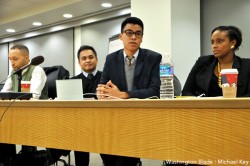
Gertrude Stein Democratic Club President-elect Martin Garcia (Washington Blade photo by Michael Key)
Former club president Kurt Vorndran, who was among the longtime members who called for letting the election of the new officer’s stand, introduced a resolution calling for changing the club’s bylaws to restrict the ability to vote in the election of club officers to people who have been members for at least 30 calendar days.
The club voted to table Vorndran’s motion, with the intent to bring it up at the next regular meeting in January.
Craft told the Blade he believes many of the old members will withdraw from active participation in the club due to the flap over the election and for what he said was the failure of the special meeting to enable longtime members to raise concerns and ask questions.
“I feel the meeting tonight was a complete farce,” he said. “I feel it was staged, that Lane Hudson through his motions made it impossible for the meaningful exchange of information that was the purpose of this meeting to take place.”
Craft was referring to a set of rules governing the meeting that Williams and the existing Stein Club officers proposed at the beginning of the meeting but that were changed by motions introduced by Hudson and other members supportive of Garcia’s slate.
The changes, among other things, reduced the length of time for people to speak from three minutes proposed by Williams and the club’s board, to two minutes. Toward the end of the meeting, when a question and answer period called for by the rules proposed by Williams and approved by the meeting participants began, Hudson introduced a motion to end it after just two questions were raised and answered. The meeting attendees — the majority of whom were new members supportive of Garcia’s slate of officers — quickly voted to approve Hudson’s motion.
Craft said the abrupt termination of the question and answer period upset him and other longtime club members who wanted to ask more questions of Garcia and the other newly elected officers.
While Craft spoke to the Blade immediately after the meeting adjourned, club member Robert Brannum shouted to the members collecting their belongings and leaving the meeting room that he was outraged he wasn’t allowed to speak during the closing session of the meeting. When Brannum, who spoke earlier in the meeting, requested to speak at the closing session, Hudson and other members objected, saying the rules adopted at the start of the meeting prevented him from doing so.
“The whole purpose of having an orderly meeting is to achieve the objectives of the meeting, and that’s what we did,” Hudson told the Blade. “People had their say, they came together and we’re in a much better place than when the meeting began.”
In a statement she sent to the Blade Thursday morning, Williams said more effort will be needed to heal the rift between all of the old and new members.
“I think the meeting was successful as an initial first step at dialogue between long term and new members and bringing both groups together,” she said. “Unfortunately, due to some motions that ended the dialogue early, some members still feel that they did not have an opportunity to have their questions addressed.”
Williams added, “I think the key is to look at this meeting as the beginning of the process of healing and not the culmination of it. I hope that all members continue to engage one another to work through any concerns that may still exist. I wish the new board well and I hope that they continue efforts to help bridge the gap between long term and new members.”
District of Columbia
Two charged with assaulting, robbing gay man at D.C. CVS store
Incident occurred after suspects, victim ‘exchanged words’ at bar

D.C. police just after 1 a.m. on April 10 arrested two men for allegedly assaulting and robbing a gay man inside a CVS store at 1418 P St., N.W., according to a police report and charging documents filed in D.C. Superior Court.
The charging documents state that the alleged assault and robbery occurred a short time after the three men “exchanged words” at the gay bar Number 9, which is located across the street from the CVS.
The arrested men are identified in the charging documents as Marquel Jose Diaz, 27, of Northwest D.C., and Lorenzo Jesse Scafidi, 21, of Elizabeth City, N.C. An affidavit in support of the arrest for Diaz says Diaz and the victim “were previously in a relationship for a year.”
Court records show Diaz was charged with Simple Assault, Theft Second Degree, and Possession of a Controlled Substance. The court records show the controlled substance charge was filed by police after Diaz was found to be in possession of a powdered substance that tested positive for cocaine.
Scafidi was charged with Simple Assault and Theft Second Degree, the court records show.
The D.C. police report for the incident does not list it as a suspected hate crime.
The court records show both men pleaded not guilty to the charges against them at a Superior Court arraignment on the day of their arrest on April 10. The records show they were released by a judge while awaiting trial with an order that they “stay away” from the victim. They are scheduled to return to court for a status hearing on May 21.
The separate police-filed affidavits in support of the arrests of both Diaz and Scafidi each state that the two men and the victim “exchanged words” inside the Number 9 bar. The two documents state that both men then entered the CVS store after the victim went to the store a short time earlier.
Scafidi “came into the CVS shortly after and entered the candy aisle and slammed Complainant 1 [the victim] to the ground causing Complainant 1’s phone to fall out of CP-1’s pocket,” one of the two affidavits says. It says Scafidi “again picked up CP-1 and slammed him to the ground.”
The affidavit in support of Diaz’s arrest says Diaz also followed the victim to the CVS store after words were exchanged at the bar. It says that after Scafidi allegedly knocked the victim down in the candy aisle Diaz picked up the victim’s phone, “swung on” the victim “while he was still on the ground,” and picked up the victim’s watch before he and Scafidi fled the scene.
Without saying why, the two arrest affidavits say Diaz and Scafidi returned to the scene and were arrested by police after the victim and at least one witness identified them as having assaulted and robbed the victim.
Attorneys representing the two arrested men did not respond to phone messages from the Washington Blade seeking comment and asking whether their clients dispute the allegations against them.
The victim also did not respond to attempts by the Blade to obtain a comment from him. The police report says the victim is a resident of Fairfax, Va.
District of Columbia
Bowser calls for ‘extraordinary’ response to reduction in D.C. budget
Impact on city funding for LGBTQ programs and grants unclear

D.C. Mayor Muriel Bowser on April 15 issued an executive order calling for “extraordinary actions,” including “significant cuts in District Government services,” to address a decision by Congress to cut the city’s current budget by $1.1 billion.
The nine-page executive order points out that these actions became necessary after the U.S. House of Representatives has so far declined to vote on a free-standing bill approved by the U.S. Senate last month that would restore the $1.1 billion D.C. budget cut initially approved by the House.
In addition to large-scale cuts in city services, the mayoral order says the congressionally imposed city budget cut will bring about city “hiring freezes, financial impacts to employees, reductions and terminations in contracts and grants, and closures of District Government facilities.”
The order adds, “These are unprecedented actions given that the District itself adopted and is able to implement a fully balanced budget, but they are necessary due to the Congressional cut to the District’s budget and its inaction in timely fixing its legislative error.”
The House adjourned this week on a recess until the end of April, and congressional observers say it is unclear whether the majority Republican House will take up the Senate bill to undo the D.C. budget cut when the House returns from its recess. President Donald Trump has called on the House to approve the bill to restore the full D.C. budget.
Among the D.C. LGBTQ organizations and those providing services to the LGBTQ community that receive D.C. government funding and that could be impacted by the budget cuts are Capital Pride Alliance, which is organizing WorldPride 2025 set to take place in D.C. next month; and Whitman-Walker Health, one of the city’s largest private healthcare organizations that provides medical services for LGBTQ clients.
Also receiving city funding are the Wanda Alston Foundation, which provides housing services for LGBTQ people; and the LGBTQ youth advocacy and services organization SMYAL.
Spokespersons for the four organizations couldn’t immediately be reached to determine if they knew whether the soon-to-be implemented budget cuts would have an impact on the city funding they currently receive.
In response to questions from news reporters during an April 15 press conference call to discuss the Bowser executive order, Jenny Reed, director of the D.C. Office of Budget and Performance Management, said details on specific programs or funding allocations set to be cut would not be known until the mayor submits to the D.C. Council her Supplemental FY 2025 budget along with her proposed FY 2026 budget.
Reed was joined at the press briefing by Lindsey Parker, Mayor Bowser’s chief of staff; and Tomas Talamante, director of the Office of Intergovernmental Affairs.
They and other city officials have said the impact of the congressionally imposed city budget cut was expected to be lessened but remain highly problematic by Bowser’s decision to invoke a 2009 law that allows the city to increase its own spending without approval by Congress under certain circumstances.
The mayor has said under that law, the city would need to cut its FY 2025 budget by $410 million rather than by $1.1 billion. It couldn’t immediately be determined whether House Republicans, who initiated the requirement that the D.C. budget be cut by $1.1 billion, would challenge the mayor’s plan to invoke the 2009 law to reduce the size of the budget cut.
“Without the ability to fully execute the Fiscal Year 2025 budget as adopted and approved by the District, this gap will force reductions in critical services provided by our largest agencies, including the Metropolitan Police Department and the Fire and Emergency Medical Services Department,” the mayor’s executive order states.
“The District will continue to work with members of the House of Representatives to urge them to vote to fully restore the District’s Fiscal year 2025 budget and will continue to work with President Trump to strongly encourage the House of Representatives to take that action,” the order says.
District of Columbia
LGBTQ budget advocates fight for D.C. resources in a tough fiscal year
‘Trying to preserve life-saving services’ amid $1 billion cut

The months and days leading up to June are especially busy for LGBTQ Washingtonians. For one group, the DC LGBT Budget Coalition, which works year-round to ensure LGBTQ residents are represented and financially supported by the D.C. government, this time of year is their Super Bowl. Beginning in April, the D.C. Council and Mayor’s Office hold budget hearings for the next fiscal year.
With D.C.’s budget now under review, the Washington Blade spoke with Heidi Ellis, coordinator of the DC LGBT Budget Coalition, about the group’s top priorities and their push to ensure continued support for queer communities.
“The LGBTQ Budget Coalition was founded in 2020 at the height of the pandemic, as a way for the community to work together to advocate for key funding and policy changes,” Ellis said. “We recognized we were stronger together. A lot of groups are often pitted against each other for resources and dollars. This coalition was founded out of a need for unity. Since then, we’ve successfully advocated for more than $20 million in dedicated LGBTQ investments.”
In addition to coordinating the coalition, Ellis is the founder and CEO of HME Consulting & Advocacy, a firm that helps build coalitions and advance policy initiatives that address intersectional issues in the LGBTQ community. One of its most powerful tools, she explained, is direct outreach through community surveys.
“We actually do community surveys to see what people need and what’s top of mind,” Ellis said. “Of course, we also pay attention to the broader political landscape — like the current threats to HIV funding. That helps us prioritize.”
Because the coalition is comprised of more than 20 organizations across various sectors —healthcare, housing, community organizing — Ellis said its diversity enables it to connect grassroots needs to potential policy solutions.
“Our coalition includes service providers, community groups, health and housing advocates-folks who are deeply plugged into what’s happening on the ground,” she said. “They help determine our direction. We know we don’t represent every queer person in D.C., but our coalition reflects a wide range of identities and experiences.”
The insights gathered through those surveys ultimately inform the coalition’s annual budget proposal, which is submitted to the Council and mayor.
“That’s how we got to our FY26 priorities,” she said. “This year, more than ever, we’re fighting to protect what we’ve already secured — funding and policies we’ve had to fight for in the past. We know there’s concern around this budget.”
One of the challenges this year is that the D.C. government’s operating budget and some of its legislation must be approved by Congress. With a projected decline in tax revenue and a Republican-controlled Congress that has historically opposed LGBTQ funding, the Coalition has had to think strategically.
“Even before the situation on the Hill, the CFO projected lower revenue,” Ellis said. “That meant cuts to social programs were already coming. And now, with the $1 billion slashed from D.C.’s budget due to the continuing resolution, we’re not only fighting for D.C.’s budget and autonomy, but also trying to preserve life-saving services. Our message is simple: Don’t forget about queer people.”
This year’s proposal doesn’t include specific dollar figures. Instead, the Coalition outlines five funding priority areas: Healthcare, Employment & Economic Equity, Housing, Safety & Community Support, and Civil Rights.
Why no exact amounts? Ellis said it’s because not all solutions are financial.
“Some of our asks don’t require new funding. Others build on existing programs-we’re asking whether the current use of funds is the most effective. We’re also proposing policy changes that wouldn’t cost extra but could make a real difference. It’s about using what we have better,” she said.
When drafting the proposal, the Coalition tries to prioritize those with the most pressing and intersecting needs.
“Our perspective is: If we advocate for the most vulnerable, others benefit too,” Ellis said. “Take LGBTQ seniors. Some may have done well in life but now face housing insecurity or struggle to access affordable healthcare. Many in our coalition are elders who fought on the frontlines during the AIDS epidemic. They bring critical historical context and remind us that Black and brown communities bore the brunt of that crisis.”
“I love our coalition because it keeps us accountable to the moment,” she added. “If we center those most marginalized, we can make an impact that lifts everyone.”
In addition to healthcare and housing, safety remains a top concern. The Coalition has fought to maintain funding for the Violence Prevention and Response Team (VPART), a city-supported group that includes MPD, community-based organizations, and the Mayor’s Office of LGBTQ Affairs. VPART responds to crimes affecting the LGBTQ community and connects victims to legal, healthcare, and housing services.
“We’ve pushed to make VPART more proactive, not just reactive,” Ellis said. “The funding we’ve secured has helped survivors get the support they need. Cutting that funding now would undo progress we’re just beginning to see.”
At the end of the day, Ellis emphasized that this process is about far more than spreadsheets.
“A budget is a moral document,” she said. “If we’re not represented, you’re telling us our lives don’t matter at a time when we need protection the most. When people can’t get food, medicine, housing — that has a devastating impact. These are vital services.”
The DC LGBT Budget Coalition is urging residents to support a letter-writing campaign to D.C. Council members and the mayor. You can send a letter here: https://actionnetwork.org/letters/fully-fund-dcs-lgbtq-communities
Read the full FY26 budget proposal here: https://drive.google.com/file/d/1bTrENnc4ZazJTO6LPrQ3lZkF02QNIIf1/view
-

 The White House5 days ago
The White House5 days agoWhite House does not ‘respond’ to reporters’ requests with pronouns included
-

 District of Columbia2 days ago
District of Columbia2 days agoReenactment of 1965 gay rights protest at White House set for April 17
-

 Hungary2 days ago
Hungary2 days agoHungarian MPs amend constitution to ban public LGBTQ events
-

 Maryland2 days ago
Maryland2 days agoFreeState Justice: Transgender activist ‘hijacked’ Moore’s Transgender Day of Visibility event

